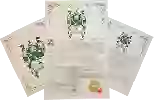
Winery CDLCôtes-du-Rhône
This wine generally goes well with beef, game (deer, venison) or lamb.
Food and wine pairings with Côtes-du-Rhône
Pairings that work perfectly with Côtes-du-Rhône
Original food and wine pairings with Côtes-du-Rhône
The Côtes-du-Rhône of Winery CDL matches generally quite well with dishes of beef, lamb or game (deer, venison) such as recipes of pot-au-feu, irish stew with beer or wild boar leg of 7 hours.
Details and technical informations about Winery CDL's Côtes-du-Rhône.
Discover the grape variety: Pinot noir
Pinot noir is an important red grape variety in Burgundy and Champagne, and its reputation is well known! Great wines such as the Domaine de la Romanée Conti elaborate their wines from this famous grape variety, and make it a great variety. When properly vinified, pinot noit produces red wines of great finesse, with a wide range of aromas depending on its advancement (fruit, undergrowth, leather). it is also the only red grape variety authorized in Alsace. Pinot Noir is not easily cultivated beyond our borders, although it has enjoyed some success in Oregon, the United States, Australia and New Zealand.
Informations about the Winery CDL
The Winery CDL is one of of the world's great estates. It offers 17 wines for sale in the of Côtes-du-Rhône to come and discover on site or to buy online.
The wine region of Côtes-du-Rhône
The wine region of Côtes-du-Rhône is located in the region of Rhône méridional of Rhone Valley of France. Wineries and vineyards like the Château de Beaucastel or the Chateau de Fonsalette produce mainly wines red, white and pink. The most planted grape varieties in the region of Côtes-du-Rhône are Mourvèdre, Viognier and Marsanne, they are then used in wines in blends or as a single variety. On the nose of Côtes-du-Rhône often reveals types of flavors of pineapple, red plum or sour cherry and sometimes also flavors of truffle, juniper or clove.
The wine region of Rhone Valley
The Rhone Valley is a key wine-producing region in Southeastern France. It follows the North-south course of the Rhône for nearly 240 km, from Lyon to the Rhône delta (Bouches-du-Rhône), near the Mediterranean coast. The Length of the valley means that Rhône wines are the product of a wide variety of soil types and mesoclimates. The viticultural areas of the region cover such a distance that there is a widely accepted division between its northern and southern parts.
The word of the wine: Musty (taste of)
A disgusting taste due to a defect in the grapes or, more commonly, a defect in the barrel.














